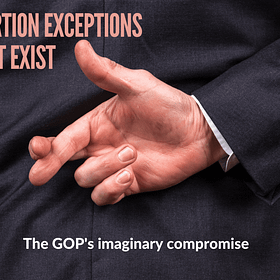Lots going on this week (didn’t abortion news ever hear of a holiday??) but hopefully today’s synthesis makes you feel a little less overwhelmed. To start, though, if you happened to have missed my column on conservatives’ newest messaging strategy definitely check it out. It’s an important one, and we’re going to see a lot of this going forward.
The Anti-Abortion Movement’s Language War
By the way, just a few days after I published this piece, we got our hands on some exclusive audio of Republican strategist Karl Rove talking about what the GOP should do on abortion—and what he said confirmed all of Abortion, Every Day’s predictions. They want Americans to believe that a national ban is a compromise. Make sure your friends and family aren’t fooled by it.
State Updates
We saw a few major things happen in the states this week, so let’s start with good news: Ohio pro-choice advocates collected nearly twice number of signatures they needed to get abortion rights on the ballot. It’s a huge feat, especially considering the months-long attacks by Republicans and anti-abortion activists in the state. For a run-down of all the various ways that conservatives have been trying to stop this ballot measure, click here. (The short version is: lawsuits, multi-million dollar anti-trans ad campaigns, and anti-democratic legislation.)
In other ballot measure news, abortion rights proponents in Florida are trying to get the word out about their effort on the issue; Floridians Protecting Freedom has already started collecting signatures for the measure. (Fun fact: one of its supporters happens to be a retired Florida Supreme Court Chief Justice.)
And as we wait for state Supreme Court decisions on abortion in both Florida and South Carolina, activists asked donors in The Chronicle of Philanthropy not to give up on the South by focusing funding solely on safe-haven states: “It’s possible to protect and expand abortion access across the country while also defending reproductive equity in the South.”
Speaking of the South: North Carolina started its first week under a new 12-week abortion ban, legislation that activists say has left people confused about whether they can get an abortion at all. Even worse, anti-abortion activists are using that confusion to their advantage. Tara Romano, executive director of Pro-Choice North Carolina, says, “They stand outside of clinics and tell people they’re breaking the law, especially if the patients are here from out of state. They spread misinformation all day.”
But the week’s biggest state news came out of Iowa, where Gov. Kim Reynolds called for a special legislative session for the sole purpose of getting a new abortion ban passed. This comes after the state Supreme Court declined to reinstate a 6-week abortion ban. (The Court was split 3-3 because one justice recused herself.)
Iowa Republicans dropped the new bill late yesterday, and it’s just about as bad as we expected. The legislation is near-identical to legislation that Reynolds pushed in 2018, and bans abortion after a ‘fetal heartbeat’ is present—which they define as any cardiac activity. As has been pointed out by expert after expert, there is no actual heartbeat that early into pregnancy because there is no heart.
The ‘exceptions’ for rape and incest are similarly absurd: Rape victims can supposedly have abortions if they report the attack within 45 days. But we know that the victims rarely report; if they do, they certainly don’t do it quickly. (Which, of course, is the point—the legislation was written to ensure that the ‘exceptions’ would never be used.) Incest victims will get 140 days to report their attack.
The law says abortion in cases of miscarriage is permitted (how generous)—but only if there’s no fetal heartbeat. That distinction has been a major factor in women going septic in anti-choice states, because it stops doctors from ending a doomed pregnancy until either the heartbeat stops or the pregnant person’s life is in danger.
That leads us to the ‘exceptions’ for health and life: Before a patient can qualify for an abortion, doctors must deem their condition a life-threatening medical emergency. OBGYN Dr. Emily Boevers told the Iowa Capital Dispatch that the law will put women’s lives at risk:
“I’m very concerned about the dramatic responsibility that it’s going to place on health care providers to try to decide how urgently someone might die from their pregnancy, to try to look and see whether—minute-to-minute, when that chemical reaction will start to happen that is a so-called ‘fetal heartbeat’ at six weeks, and how we’re going to have to justify mothers dying because our governor and our representatives think that that is less important than an early pregnancy.”
If you’re in Iowa and want to do something: There will a public hearing on the bill on Tuesday morning at the State Capitol—you can sign up to testify or submit public comment here. Planned Parenthood is organizing a protest at the Capitol that morning as well, of you’re nearby and want to join.
In better news…
Maine expanded abortion access past 24 weeks with a doctor’s recommendation. Gov. Janet Mills, who proposed the legislation, is expected to sign the recently-passed law.
Arizona Gov. Katie Hobbs has effectively decriminalized abortion in the state, after transferring the power to prosecute abortion cases away from district attorneys and to pro-choice Attorney General Kris Mayes.
Illinois will now limit the kind of data it publicly shares about abortions performed in the state. The move is meant to protect patients who both live in the state and those who travel to Illinois for care.
And in my home state of New York, the abortion rights ballot measure that will be in front of voters in 2024 also protects a whole host of interconnected issues like LGBTQ and disability rights. You can find the text of the Equal Protection of Law Amendment here.
The Care Crisis
We focused a lot on the post-Roe care crisis this week, here are the takeaways:
OBGYNs & maternal fetal medicine specialists are continuing to leave anti-choice states, while doctors in pro-choice states report seeing more and more out-of-state patients with complicated and risky pregnancies.
The closure of a hospital maternity ward in Tennessee reminded us that the women most-impacted in anti-choice states will be from rural areas. (And that Republicans are dismissing any connection between hospital closures and their abortion bans.)
Doctors in anti-abortion states who do stay, working in the hospitals that manage to keep their maternity wards open, report confusion over the law—with many not even knowing if they can provide life-saving abortions.
Knowing that all of the above issues will lead to an increase in maternal death rates, Republicans are already working to hide or sow distrust in maternal health data. (Lawmakers in Idaho, for example, completely dismantled the state’s maternal mortality committee.)
The Rise of Anti-Abortion Centers
Something closely connected to the post-Roe care crisis—and sure to exacerbate it—is the massive increase in funding to religious anti-abortion centers. Republicans in anti-abortion states are framing support for the groups as a way to help women and families, when really they’re just funneling millions of taxpayer dollars to religious organizations that shame and lie to women. (Who will maybe get a package of diapers in return, if they’re lucky.)
Abortion, Every Day told you about the centers in Louisiana, for example, who are now getting $30 million worth of income tax breaks through 2030. And in Missouri, The Kansas City Star reported that Republicans are funding centers in the state to the tune of over $8 million as part of their ‘Alternatives to Abortion’ program. (Abortion is illegal in Missouri—so why does the state need to allocate millions of dollars to religious organizations to convince women not to have them?)
A few important things to know from what we highlighted this week:
Anti-abortion centers are already well funded. A representative from Abortion Access Front told Orlando Weekly, “I think there’s a misconception that these are like small little charities in communities opening up just trying to talk to people. They don’t understand this is a global network.”
These groups aren’t just anti-abortion centers: The networks receiving funding in Louisiana, for example, also prohibit dispensing or promoting birth control. I’m betting the same is true for other state-funded centers.
Despite claims that they help women with diapers and baby clothes, we know that anti-abortion centers often won’t give material aid without something in return: like making women ‘earn’ diapers or baby clothes by requiring them to go to Bible classes.
These groups lie to women and shame them. A young woman from Florida we heard from this week was harassed for weeks by an anti-abortion center that gave her an ultrasound. They called her again and again to ask if she had gotten an abortion; even when she asked them to stop calling her, they refused. They only stopped when she told them she’d carry the pregnancy to term.
The centers are being given an incredible amount of power and money while essentially operating unchecked: most states have no regulatory authority over anti-abortion centers. (And we already know what the consequences of that lack of regulation leads to.)
Because of the negative associations that Americans have with ‘crisis pregnancy center’—and because ‘anti-abortion centers’ makes it clear who these groups are—conservatives are trying to rebrand the groups as ‘maternal wellness centers’.
To recap: Republicans want to give religious groups that lie to women more money, more power, and less regulation—all while framing it as a way to help women and children. It’s also important to remember that the increased focus on anti-abortion centers comes at the same time that conservatives want to expand those groups’ reach by turning them into ‘maternity homes’ where vulnerable pregnant people live. So yeah, total fucking nightmare!
In Case You Missed It
Reproductive rights groups are pressuring the Biden administration (as they should) to reform the Supreme Court—including expansion.
A new study shows that abortion medication could be safe after the first trimester (a reminder that women in the U.S. are already using it past the FDA’s limit because of hurdles put in place by state abortion bans).
Conservatives continue to redefine the middle as ‘supporting birth control’ (even while many of them don’t);
And a really nice reminder that the work we’re doing here is making an impact.
Finally, if you missed my column this week on exceptions—and how they don’t exist—please check it out and share with friends. Republicans’ renewed focus on exceptions is going to play a huge role in their anti-abortion strategy going forward, and it’s vital that people know that these allowances aren’t actually real.






Everything was so enraging in today's newsletter but this part was the most enraging to me:
"Knowing that all of the above issues will lead to an increase in maternal death rates, Republicans are already working to hide or sow distrust in maternal health data. (Lawmakers in Idaho, for example, completely dismantled the state’s maternal mortality committee.)"
There's nothing more telling about how much they really do not give a shit about women's lives.
“Why heartbeat?” We need to pressure media to start asking some basic questions: Yes, there is no heart, but also since when does heartbeat define ‘life’? Why does someone facing sepsis have to wait for a pump to stop functioning? Why aren’t anti-abortionists ‘rescuing’ ‘post-conception unborn babies’ from wastewater, if they really believe conception is the standard?